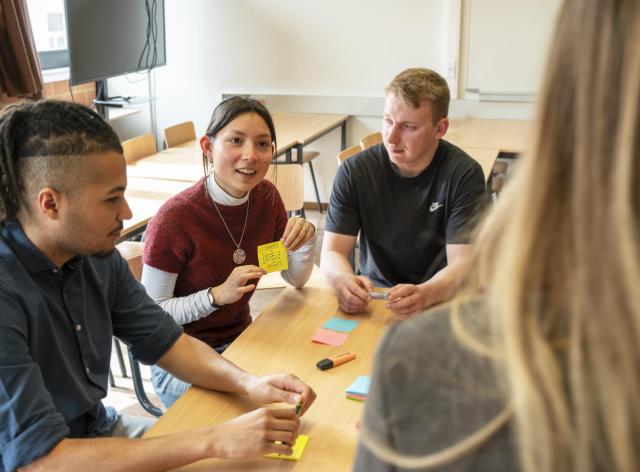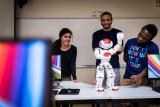Informatics is one of the pillars of our society. The Faculty of Computer Science therefore has a particular duty to provide services to society.
Concretely, these services materialize in particular through the creation of synergies between researchers and industry, through involvement in a partnership with the Government of the Wallonia-Brussels Federation, and through the provision of knowledge and know-how.
Research-industry synergies
The Infopole is positioned within the logic of clusters of excellence. With this in mind, its aim is to federate available academic and industrial skills to form a center of excellence in public and private management information and communication systems.
The CETIC (Center of Excellence in ICT), is a center for applied research in software engineering and electronic systems. It is an agent of connection, of technology transfer between university research and companies. CETIC was founded by the University of Namur, UCL and FPMs. It is financially supported by the Walloon Region and the European Union. The Faculty of Informatics is an active member of CETIC, and develops projects there in the fields of software quality, certification, specifications and complex data migration.
Involvement in the "Brevets de management public" program
This involvement consists of taking part in teaching as part of the 'Brevets de management public'. Provided for by the Government of the Wallonia-Brussels Federation, the Brevet de management public - interuniversitaire - is offered to all candidates for the award of a mandate within the framework of the Ministry of the French Community and certain public interest organizations dependent on it.
Participation in the e-Government Chair
The Faculty of Informatics is a stakeholder in the Chaire e-Gouvernement, offering the public sector independent expertise in law and informatics for issues relating to this field, through consultancy, training and scientific research missions.
Participation in the EduCoNum Chair
The Faculty of Computer Science is a stakeholder in the Chaire EduCoNum, aimed at supporting research related to the issues of digitizing our society and educating citizens and workers in digital media and technologies.
Involvement in scientific mediation
Computer science is now an integral part of the scientific culture needed to understand the world around us. That's why the Faculty of Computer Science is committed to scientific mediation missions (scientific events, conferences for the general public, educational resources, film debates, etc.). Through these activities, the Faculty of Computer Science aims to inform, arouse curiosity, popularize academic knowledge ... and also to remove supposed barriers to entry to the University!
Raising awareness of gender issues
Informing, raising awareness and improving the perception of STEAM studies, and particularly computer science studies, among "girls" is a challenge that the Faculty of Computer Science must take up. The inclusion of all in the digital development of our society is essential.
Involvement in lifelong learning
The continuing education is complementary to initial training. The Faculty of Computer Science is committed to the socio-economic development of the regions by organizing a number of training courses (diploma or certification courses) aimed at an adult public.
Participation in various scientific bodies
Computer Science faculty members are regularly asked to participate in journal editorial boards, symposium organizing committees, reading committees for various scientific journals, national and international commissions (FNRS, FWO, EU ...).





